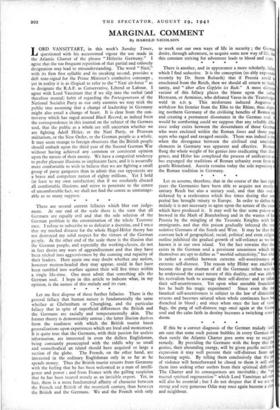Let me first dispose of three further fallacies. There is
the general fallacy that human nature is fundamentally the same whether at Cheltenham or Chungking, and the particular fallacy that in spite of superficial differences the British and the Germans are racially and temperamentally akin. The former theory is demonstrably untrue ; the latter illusion derives from the readiness with which the British tourist bases generalisations upon experiences which are local and momentary. It is quite true that the Germans, with their passion for useless information, are interested in even the dullest Englishman, being constantly preoccupied with the riddle why so small and unmethodical an island should have acquired so large a section of the globe. The French, on the other hand, are interested in the ordinary Englishman only in so far as he spends money. Thus the British tourist returns from Germany with the feeling that he has been welcomed as a man of intelli- gence and power ; and from France with the galling suspicion that he has been treated merely as an invisible export. Yet, in fact, there is a more fundamental affinity of character between the French and British of the twentieth century, than between the British and the Germans. We and the French wish only to work out our own ways of life in security ;- the Germax desire, through adventure, to acquire some new way of life. Alt this constant striving for adventure leads to blood and tears


































 Previous page
Previous page